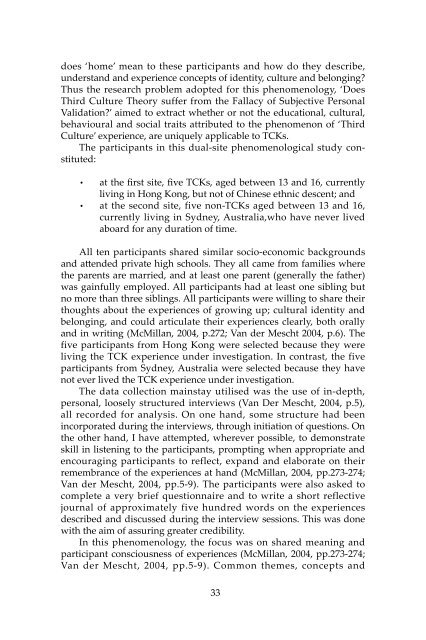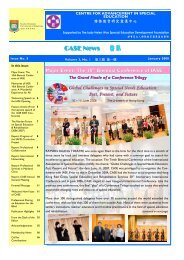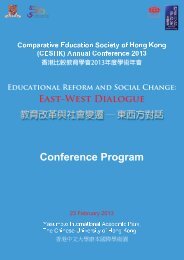Comparative Education Bulletin - Faculty of Education - The ...
Comparative Education Bulletin - Faculty of Education - The ...
Comparative Education Bulletin - Faculty of Education - The ...
Create successful ePaper yourself
Turn your PDF publications into a flip-book with our unique Google optimized e-Paper software.
does ‘home’ mean to these participants and how do they describe,<br />
understand and experience concepts <strong>of</strong> identity, culture and belonging?<br />
Thus the research problem adopted for this phenomenology, ‘Does<br />
Third Culture <strong>The</strong>ory suffer from the Fallacy <strong>of</strong> Subjective Personal<br />
Validation?’ aimed to extract whether or not the educational, cultural,<br />
behavioural and social traits attributed to the phenomenon <strong>of</strong> ‘Third<br />
Culture’ experience, are uniquely applicable to TCKs.<br />
<strong>The</strong> participants in this dual-site phenomenological study constituted:<br />
•<br />
•<br />
at the first site, five TCKs, aged between 13 and 16, currently<br />
living in Hong Kong, but not <strong>of</strong> Chinese ethnic descent; and<br />
at the second site, five non-TCKs aged between 13 and 16,<br />
currently living in Sydney, Australia,who have never lived<br />
aboard for any duration <strong>of</strong> time.<br />
All ten participants shared similar socio-economic backgrounds<br />
and attended private high schools. <strong>The</strong>y all came from families where<br />
the parents are married, and at least one parent (generally the father)<br />
was gainfully employed. All participants had at least one sibling but<br />
no more than three siblings. All participants were willing to share their<br />
thoughts about the experiences <strong>of</strong> growing up; cultural identity and<br />
belonging, and could articulate their experiences clearly, both orally<br />
and in writing (McMillan, 2004, p.272; Van der Mescht 2004, p.6). <strong>The</strong><br />
five participants from Hong Kong were selected because they were<br />
living the TCK experience under investigation. In contrast, the five<br />
participants from Sydney, Australia were selected because they have<br />
not ever lived the TCK experience under investigation.<br />
<strong>The</strong> data collection mainstay utilised was the use <strong>of</strong> in-depth,<br />
personal, loosely structured interviews (Van Der Mescht, 2004, p.5),<br />
all recorded for analysis. On one hand, some structure had been<br />
incorporated during the interviews, through initiation <strong>of</strong> questions. On<br />
the other hand, I have attempted, wherever possible, to demonstrate<br />
skill in listening to the participants, prompting when appropriate and<br />
encouraging participants to reflect, expand and elaborate on their<br />
remembrance <strong>of</strong> the experiences at hand (McMillan, 2004, pp.273-274;<br />
Van der Mescht, 2004, pp.5-9). <strong>The</strong> participants were also asked to<br />
complete a very brief questionnaire and to write a short reflective<br />
journal <strong>of</strong> approximately five hundred words on the experiences<br />
described and discussed during the interview sessions. This was done<br />
with the aim <strong>of</strong> assuring greater credibility.<br />
In this phenomenology, the focus was on shared meaning and<br />
participant consciousness <strong>of</strong> experiences (McMillan, 2004, pp.273-274;<br />
Van der Mescht, 2004, pp.5-9). Common themes, concepts and<br />
33
















